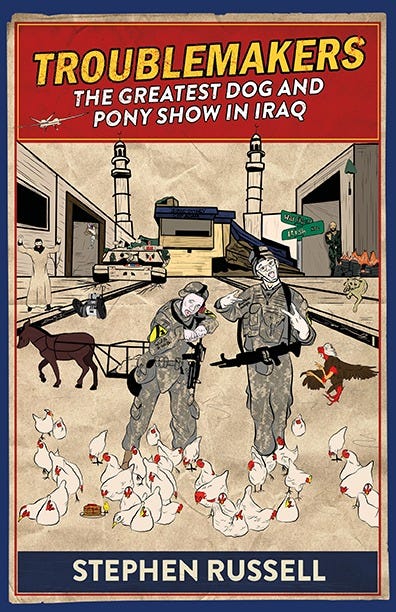The Iraq War was a mockery of American values
Are we prepared for a future where suffering is the new normal for our children?
As Veterans Day approaches, I want to reflect on the impact of militarism and security-driven foreign policy over the past few decades. Each year, the world seems to grow more unstable, while the military-industrial complex—warned about by President Eisenhower—continues to expand. We now face the prospect of another global conflict, one rooted in subterfuge, authoritarianism, and imperial ambitions.
I don't consider myself a victim of U.S. imperialism abroad, but rather a willing participant. As a veteran of the Iraq War, I see how that conflict was an episode in America’s longstanding entanglement in the Middle East, part of a larger strategy driven by more than just religious or economic motivations. It’s a mockery of the morals and values we claim to uphold as free citizens. Since the Revolutionary War, we’ve been fed the lie that freedom must be won through bloodshed, yet the freedom we fight for seems to benefit only the wealthy and powerful. It is an American tradition since the close of our first war to deny veterans the benefits promised for their participation in those wars.
Since Vietnam, sending soldiers to war has become easier and cheaper for Americans. A steady supply of volunteers, lured by promises of opportunity and respect, has fueled conflicts that most citizens will never directly experience. We spent twenty years at war, only to fall short of our goals, as even President George W. Bush has acknowledged with his own regrets about where those wars have led us.
Perhaps you have a nephew or cousin who struggled after their service, or one who was injured or disabled. Are we prepared for a future where such suffering becomes the new normal for our children? We can all agree that defending our country is important, and that the sacrifices made by soldiers and veterans are meant to protect our society. But why have we devalued those sacrifices? Why are so many veterans unable to translate their military skills into civilian careers?
As a nation, we haven’t borne the full cost of our freedom. Instead, we’ve placed that burden on just one percent of the population. If a global war erupts, that won’t be the case anymore. Our sons, daughters, and grandchildren will be called upon to fight, feeding a war machine that will keep turning until we finally decide that diplomacy—not the barrel of a gun—is the true path to freedom and democracy.
This Veterans Day, let’s reflect on the sacrifices made by our military members and ask why their service hasn’t delivered the promised peace and security. Are we really prepared for the global conflict that now looms, one that will likely involve your sons, daughters, and loved ones? Are you ready for a world where standing in breadlines and growing victory gardens become the norm, just to ensure your children might get a can of vegetables on a faraway battlefield—fighting for someone else’s religious convictions or to line a defense contractor’s pockets?
I invite you to read my story. I’m not protesting war, nor the one I fought in, but I ask you to consider: Is it worth it to place this burden on the next generation?
Stephen Russell is the author of Troublemakers: The Greatest Dog and Pony Show in Iraq, published by Blue Ear Books.









Stephen thank you for your write up. Very insightful. I may venture to say the Iraq war isn't the only war that makes "a mockery of American values." The list of such actions is large, and unfortunately growing. The Military Industrial complex and our political leadership has managed to ensure war actions of our government touch only a tiny portion of the US population, excluding of course, the tax burden placed on all of us.